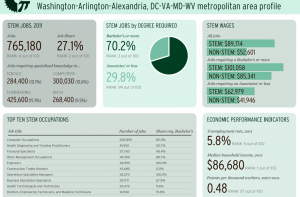Nearly 20 percent of all American jobs are in the fields of science, technology, engineering and mathematics, with the Washington region having nearly the largest share of these jobs compared to any other region in the U.S., according to study by the Brookings Institution.
The study found that 27.1 percent of Washington D.C. area jobs, which included Arlington and Alexandria, require STEM skills. The region was second only to San Jose, which had 33.2 percent of STEM-related jobs. jobs),
“D.C. is famous for being one of the highest-educated metro areas in the country, but many people assume that that knowledge is embodied in legislative knowledge and legal knowledge,” said Jonathan Rothwell, a senior research associate at Brookings. “But, in fact, many of the jobs require scientific and mathematical knowledge.”
The Washington area had 765,180 STEM jobs in 2011, which was fourth highest region in the country for these jobs. The top STEM job in Washington was computer occupations, with 205,890 jobs, followed by Health Diagnosing and Treating Practitioners (81,550 jobs), Financial Specialists (57,760 jobs), “Other Management Occupations” (49,390 jobs), and more.
The Baltimore/Towson, Maryland metropolitan area ranked eighth overall in the country for STEM jobs with 281,730 of those jobs, which was 23.1 percent of all jobs in the area. The top STEM occupations in this region were Health Diagnosing and Treating Practitioners (47,710 jobs), Computer occupations (46,150 jobs), Financial Specialists (22,780
The Brookings study cites numerous benefits that flow from having a high concentration of STEM workers in a local economy. Individuals who work in STEM fields do better economically and also contribute to a healthier local economy, including:
- More innovation – “Greater STEM skills at the metro level are strongly associated with higher patents per worker (an indicator of innovation),” the report states.
- Less unemployment – They provide jobs and a lower rate of job losses during the recent recession and recovery
- More exports – STEM jobs leads to more international exports and a greater share of the GDP, which Brookings calls “a measure of international competitiveness”
- Higher incomes – The average worker living in the most STEM oriented metropolitan areas realizes an 11 percent boost in real wages compared with those living in the least STEM oriented metropolitan areas,” Brookings said.



